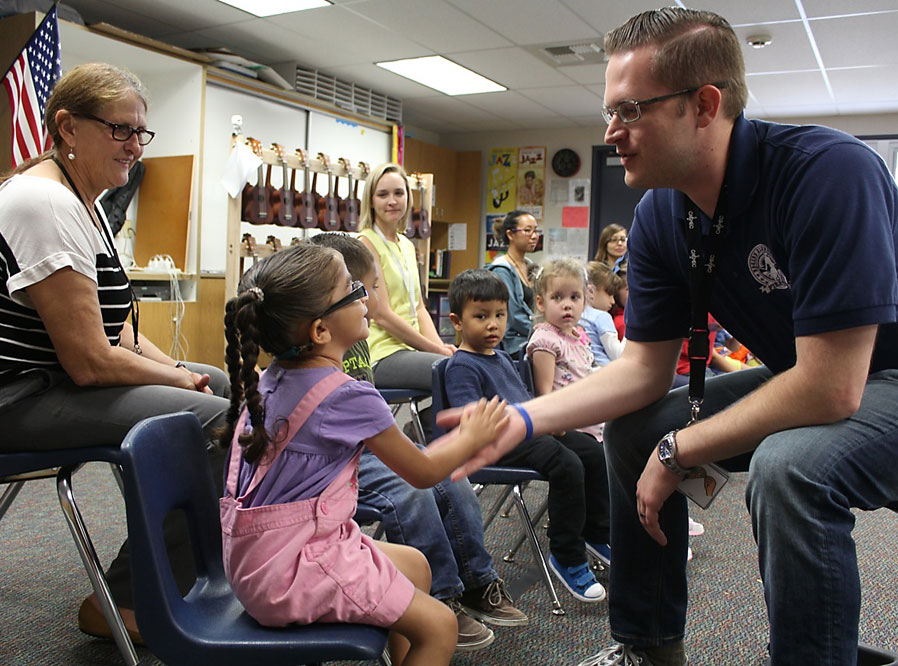An online newsletter produced by
EdSource
with support from The California Endowment
|
Dec. 7,
2016
Issue 56
|
|
|
Learning Challenges and Other Disabilities
|

Following years of complaints from guidance counselors, parents and students, the College Board
announced that the "vast majority" of students with disabilities who receive test accommodations at school -- such as increased time to take the test or frequent breaks -- will automatically receive those accommodations when taking college entrance exams. The change is effective Jan. 1, 2017, the College Board said.
"Educators, students, and families have asked us to simplify our process, and we've listened," said David Coleman, president of the College Board, which administers the SAT, PSAT, SAT subject tests and Advanced Placement exams. "The school staff knows their students best, and we want to cut down on the time and paperwork needed to submit a testing accommodations request."
Under the College Board's previous policy, guidance counselors, special education teachers and parents were required to submit lengthy documentation of the student's disability and rationale for the requested accommodation and wait up to seven weeks to get a response. Submitting the student's Individualized Education Program -- the cornerstone of a student's special education accommodations and goals -- was not sufficient. Anecdotally, parents on college application chat boards bemoaned a process they described as daunting and often
unsuccessful. Complaints prompted the Department of Justice to issue
technical guidance in fall 2015 to schools and colleges calling for students with disabilities to be allowed to have the same accommodations on the SAT that they have on school exams.
The new College Board policy allows an administrator to answer only two questions: "Is the requested accommodation(s) in the student's plan?" and "Has the student used the accommodation(s) for school testing?" "If the answer is yes to both questions, eligible students can be approved to receive most accommodations on College Board exams," the College Board said in a statement.
"The vast majority of students who are approved for and using testing accommodations at their school through a current Individualized Education Program or 504 Plan will have those same accommodations automatically approved," the College Board said. A 504 plan refers to Section 504 of the Rehabilitation Act of 1973, which requires schools to remove barriers to learning and may include accommodations such as having a student who is diagnosed with Attention Deficit Hyperactivity Disorder stand during the class rather than sit at a desk.
The College Board also said it would begin providing some native-language test instruction for English learners who take the SAT during the school day as part of a state-funded and state-mandated high school exam.
|

Educators, including teacher Gina Harris of Chicago above, have taken to Twitter with the hashtag "ImTellingMyKids" to share how they are talking with students about fears raised in the aftermath of the victory of President-elect Donald Trump. Hundreds of incidents of harassment have been reported across the country, including in California schools, according to the Southern Poverty Law Center. The harassment has included statements threatening immigrants with deportation and stating the supremacy of the white race.
To help educators, the National Education Association has created
an overview of how to respond and a list of
resources. The resources include
a guide to responding to hate and bias at school from Teaching Tolerance, a project of the Southern Poverty Law Center, that is divided into three parts --
Before a crisis occurs,
When there's a crisis and
After the worst is over.
"Unsavory pranks, bias incidents and even hate crimes can happen at any school, anywhere -- rural, urban, suburban, public, private, small, large, East, West, North or South," the guide notes.
Teaching Tolerance also is
surveying teachers on the impact of the presidential election on students and schools.
|

If President-elect Donald Trump were a high school student in California, he might find himself in a restorative justice circle making amends for his hurtful words and behavior.
"He would be in a lot of trouble," said Jaana Juvonen, a UCLA researcher who studies student bullying.
Read more at EdSource.
|
A student who can't follow directions and has outbursts of anger might be anxious, struggling with attention deficit disorder or coping with undiagnosed dyslexia.
To help teachers, school staff and parents figure out what's going on, the national nonprofit Child Mind Institute has released three articles about recognizing learning disorders in the classroom, helping students who struggle with executive function and understanding how anxiety feeds disruptive behavior.
|
More than 5,000 incidents of suicidal behavior were reported in Los Angeles Unified in the last school year, an exponential jump from the 255 reported in 2010-2011 when the district, California's largest, began tracking such incidents.
Read more at EdSource.
|
|
Special Education Services
|

The state should dismantle its system for distributing special education funding for California's 718,000 students with disabilities and send the money - billions of dollars - directly to local school districts, according to a much anticipated
report that's expected to draw the attention of Gov. Jerry Brown and state education leaders.
Read more at EdSource.
|

Most of the 3rd-graders in Anita Parameswaran's class at Daniel Webster Elementary in San Francisco have had experiences so awful that their brains won't let them easily forget.
"Whether it be that they've been sexually molested, or they've seen domestic violence, or shootings, or they know somebody who's passed away," Parameswaran said, "I would say every single year about 75 percent, give or take, come in with a lot of trauma."
Now a national campaign is recognizing, backed by research on brain development, the power of teachers like Parameswaran to lower the levels of stress hormones in a child's body and strengthen the neural connections needed for learning and self-control.
Read more at EdSource.
|
|
Webinar and Conference Call
|
|